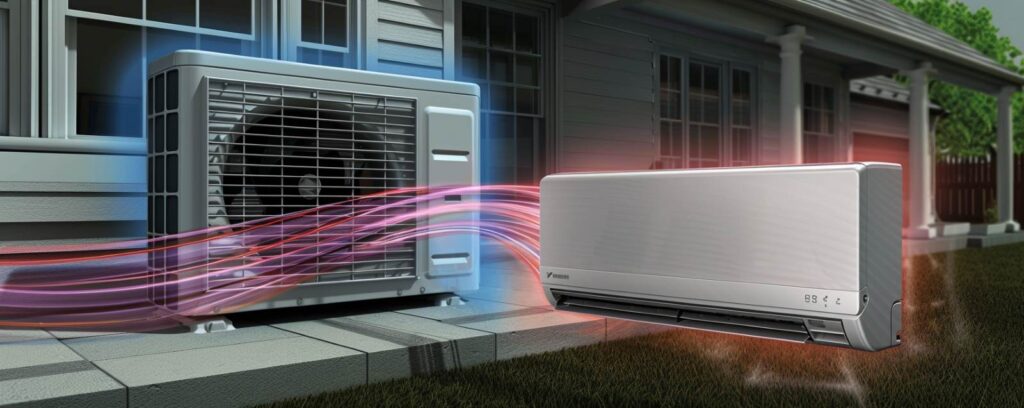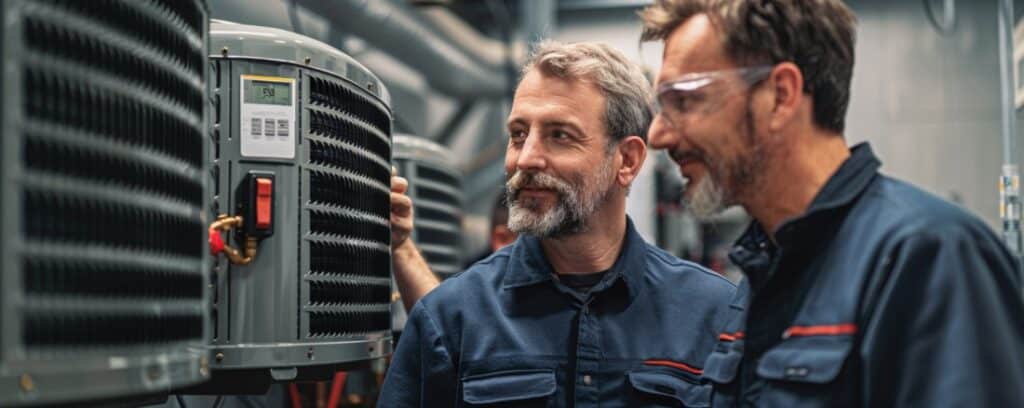- Understanding HVAC Systems
- Training and Education in HVAC
- The Learning Curve for HVAC Technicians
- Certification and Licensing Requirements
- Career Outlook for HVAC Technicians
- Job Options and Work Environments
- Benefits of Choosing an HVAC Career
- Challenges in the HVAC Industry
- Tips for Success in Learning HVAC
- Empowering Your HVAC Journey
The field of Heating, Ventilation, and Air Conditioning (HVAC) is vital for ensuring the comfort and safety of indoor environments, whether in homes, offices, or commercial spaces. As climate control technologies evolve and environmental sustainability becomes a global priority, the demand for skilled HVAC technicians continues to grow.
But is HVAC hard to learn?
This question is on the minds of many who are considering a career in this essential industry.
In this article, we’ll explore the pathways to becoming an HVAC technician, the challenges and rewards of the training process, and the long-term career prospects. By examining the complexity of HVAC systems, the required skills and knowledge, and the blend of theoretical and practical training involved, we aim to provide a comprehensive understanding of what it takes to succeed in this field.
Whether you’re a student, career changer, or simply curious about the field, this guide aims to answer the pivotal question: Is HVAC hard to learn and master?
Understanding HVAC Systems
Before diving into the complexities of learning HVAC, it’s crucial to grasp what HVAC systems encompass and the breadth of knowledge required to master them.
What Are HVAC Systems?
HVAC stands for Heating, Ventilation, and Air Conditioning. These systems are designed to maintain comfortable temperature and air quality in indoor spaces. From residential homes to large industrial buildings, HVAC systems regulate the environment to ensure safety, comfort, and energy efficiency.
The Skills and Knowledge Base Required
Working with HVAC systems requires a combination of technical skills and foundational knowledge, including:
- Understanding of Mechanical Systems: Knowing how various components like furnaces, air conditioners, and heat pumps operate.
- Electrical Knowledge: Being able to troubleshoot and repair electrical circuits and understand wiring diagrams.
- Thermodynamics: Grasping the principles of heat transfer, airflow, and refrigeration cycles.
- Environmental Awareness: Recognizing the importance of energy efficiency and environmentally friendly refrigerants.
The interdisciplinary nature of HVAC work means that technicians need to be well-versed in multiple areas of science and technology. This broad knowledge base is what makes the field challenging, yet fascinating, for newcomers.
The Role of HVAC Technicians
HVAC technicians are the professionals who install, maintain, and repair HVAC systems. Their responsibilities may include:
- Installation: Setting up new HVAC systems according to design specifications and safety standards.
- Maintenance: Performing routine checks and tune-ups to ensure systems operate efficiently.
- Repair: Diagnosing and fixing problems with HVAC systems to restore their functionality.
Becoming an HVAC technician involves not just understanding how HVAC systems work but also developing the hands-on skills to address a wide range of technical issues.
In summary, while the field of HVAC may seem daunting due to the extensive range of knowledge and skills required, the fundamental concepts can be learned and mastered with dedication and training.
Training and Education in HVAC
For those pondering if is HVAC hard to learn, understanding the training and educational pathways available is a crucial step.
HVAC training programs are designed to provide the technical knowledge and hands-on experience necessary to become competent in installing, maintaining, and repairing HVAC systems.
Types of HVAC Training Programs
HVAC training can be pursued through various educational pathways, each catering to different career goals and timelines:
- Certificate Programs: These programs typically last from a few months to a year and focus on the basics of HVAC systems, including installation, maintenance, and repair.
- Diploma Programs: Slightly longer than certificate programs, diploma courses offer a more in-depth exploration of HVAC principles, often including aspects of design and diagnostics.
- Associate Degrees: Two-year degree programs that combine HVAC training with general education courses, preparing students for a broader range of career opportunities and managerial roles.
Apprenticeships: A Path to Hands-on Experience
- Apprenticeships combine on-the-job training with classroom instruction, allowing trainees to earn while they learn. These programs can last 3 to 5 years and are often sponsored by trade unions or professional associations.
Key Subjects and Skills Covered
HVAC training encompasses a wide range of subjects to ensure technicians are well-prepared for the field:
- System Design and Configuration: Understanding how to design HVAC systems to meet specific requirements.
- Installation Techniques: Learning the proper methods for installing HVAC equipment and ductwork.
- Maintenance and Troubleshooting: Gaining skills in identifying and fixing problems with HVAC systems.
- Safety Practices: Emphasizing the importance of safety in handling refrigerants and electrical components.
Expected Duration of Training Programs and Apprenticeships
The time commitment for HVAC training varies based on the chosen path:
- Certificate and diploma programs can range from a few months to two years.
- Associate degree programs typically require two years of full-time study.
- Apprenticeships usually last between 3 to 5 years, combining work experience with classroom learning.
Training in HVAC is comprehensive, combining theoretical knowledge with practical skills. The diversity in training options allows prospective HVAC technicians to choose the path that best fits their career goals and learning preferences.
In addressing whether HVAC is hard to learn, it’s clear that while the field demands dedication and effort, the structured training programs and apprenticeships available provide a solid foundation for success.
The Learning Curve for HVAC Technicians
The question of whether HVAC is hard to learn often concerns the challenges and complexities new technicians face as they enter the field. Understanding the learning curve in HVAC is essential for setting realistic expectations and preparing for a successful career.
Grasping the Fundamentals
The initial stage of HVAC training involves mastering fundamental concepts such as thermodynamics, electricity, and refrigeration cycles.
For those without a background in these areas, this phase can be challenging.
However, with dedicated study and practical application, these foundational topics become more accessible.
Balancing Theory and Practice
A unique aspect of HVAC training is the need to balance theoretical knowledge with practical skills. Technicians must not only understand how systems work but also develop the hands-on ability to diagnose and repair them.
This dual focus can make the learning process more demanding but also more rewarding, as it prepares technicians for the real-world challenges they will face.
Keeping Up with Technological Advances
The HVAC industry is continuously evolving, with new technologies and standards emerging regularly. Staying informed about advancements in energy efficiency, smart systems, and environmentally friendly refrigerants requires a commitment to ongoing learning.
For some, this necessity to keep updating one’s knowledge can make the field seem daunting, but for others, it represents an exciting opportunity for continuous growth.
Overcoming Common Challenges
New technicians may encounter several challenges as they progress through their training and early career stages, including:
- Complex Diagnostics: Learning to accurately diagnose issues in a variety of systems can be intricate due to the myriad factors that can cause a system to fail.
- Physical Demands: The job can be physically demanding, requiring technicians to work in tight spaces, at heights, or in extreme temperatures.
- Customer Service: Technicians often deal directly with clients, necessitating strong communication skills and a professional demeanor.
Despite these challenges, the structured nature of HVAC training programs and apprenticeships ensures that students gradually build their competencies in a supportive environment.
Additionally, the satisfaction of solving complex problems and ensuring the comfort and safety of others can make overcoming these obstacles highly rewarding.
Certification and Licensing Requirements
As you navigate the journey to becoming an HVAC technician, understanding the landscape of certification and licensing is crucial. These requirements not only validate your expertise but also ensure compliance with industry standards and regulations.
Essential Certifications for HVAC Technicians
- EPA Section 608 Certification: Required for technicians who handle refrigerants, the Environmental Protection Agency (EPA) mandates this certification. It’s divided into four categories, each tailored to different types of equipment and refrigerants.
- Industry Certifications: Organizations like North American Technician Excellence (NATE) and HVAC Excellence offer certifications that demonstrate proficiency in various aspects of HVAC technology and repair. These are highly regarded by employers and can enhance job prospects.
State-specific Licensing
In addition to national certifications, many states require HVAC technicians to obtain a license to work legally. Licensing requirements vary significantly by state and can include:
- Experience and Education: Demonstrating a certain number of hours of hands-on experience or completion of an accredited training program.
- Examination: Passing a state-specific licensing exam that covers technical knowledge as well as local codes and regulations.
- Continuing Education: Some states require ongoing education to renew the HVAC license, ensuring technicians stay updated on the latest in the field.
The Impact of Certification and Licensing on Employability and Career Advancement
Holding relevant certifications and licenses is more than just a regulatory requirement—it’s a mark of professionalism and expertise that can significantly affect your career:
- Enhanced Job Opportunities: Certified and licensed technicians are often preferred by employers for their verified skill set and compliance with legal standards.
- Higher Earning Potential: Technicians with specialized certifications or licenses can command higher salaries due to their proven expertise and ability to work on more complex systems.
- Career Advancement: Certifications can open doors to supervisory or managerial roles within HVAC companies or opportunities to specialize in emerging areas like sustainable energy solutions.
The process of obtaining certifications and licenses may seem daunting, but it’s a critical step in cementing your credibility as an HVAC technician.
These credentials not only ensure adherence to safety and environmental standards but also equip technicians with the knowledge and skills necessary to excel in their careers.
In addressing whether is HVAC hard to learn, it’s clear that while there are hurdles to obtaining certifications and licenses, these steps are integral to building a successful and rewarding career in HVAC.
Career Outlook for HVAC Technicians
After navigating the intricacies of HVAC systems, completing rigorous training, and acquiring necessary certifications, understanding the career outlook is vital for those entering this field.
The demand for skilled HVAC technicians remains robust, reflecting the essential nature of HVAC services in residential, commercial, and industrial settings.
Job Prospects and Industry Demand
According to the U.S. Bureau of Labor Statistics (BLS) , employment of heating, air conditioning, and refrigeration mechanics and installers is projected to grow 6 percent from 2022 to 2032, faster than the average for all occupations. This growth is driven by:
- New Construction: The ongoing construction of residential and commercial buildings increases the need for the installation of new HVAC systems.
- Retrofitting and Upgrading: The trend towards energy efficiency and reducing environmental impact encourages retrofitting or replacing old HVAC systems with new, more efficient models.
- Maintenance and Repair: HVAC systems require regular maintenance and occasional repairs, ensuring steady work for technicians.
Impact of Climate Change and Environmental Policies
The increasing focus on climate change and sustainable living has a significant impact on the HVAC industry.
Stricter environmental regulations and a shift towards green technologies are creating opportunities for technicians skilled in energy-efficient systems, renewable energy sources, and low-emission refrigerants.
Emerging Trends in HVAC
Technological advancements and industry trends also influence the career landscape for HVAC technicians:
- Smart Home and IoT Integration: The rise of smart homes and the Internet of Things (IoT) demands technicians proficient in integrating HVAC systems with digital controls and automation.
- Indoor Air Quality: Growing awareness of health and wellness underscores the importance of indoor air quality, expanding the scope of HVAC work to include air purification and humidity control solutions.
Long-term Career Path and Advancement
HVAC technicians have various paths for career advancement, including:
- Specialization: Technicians can specialize in areas such as commercial refrigeration, solar panel installation, or smart system integration.
- Management Positions: With experience, technicians can move into supervisory roles, project management, or even run their own HVAC business.
- Continuous Learning: Engaging in ongoing education and training opens up opportunities for advancement and specialization in high-demand areas of the industry.
A Promising Field with Diverse Opportunities
The HVAC industry offers a stable and rewarding career path with a positive job outlook, competitive salaries, and opportunities for advancement.
For those wondering is HVAC hard to learn, it’s clear that while the field poses challenges, it also provides significant rewards and job satisfaction.
With the right training, certifications, and a commitment to continuous learning, aspiring HVAC technicians can look forward to a fulfilling career in an essential and ever-evolving field.
Job Options and Work Environments
The HVAC industry offers a variety of job options and work environments, each with its unique set of challenges and rewards. Understanding these can help prospective technicians choose a path that best aligns with their interests and career goals.
Residential HVAC Services
Technicians in residential settings install, maintain, and repair HVAC systems in homes. This role often requires direct interaction with homeowners, providing a customer service aspect to the job.
- Pros: Predictable work environment; potential for regular, long-term clients.
- Cons: May involve working in cramped or uncomfortable spaces; schedule can be influenced by seasonal demand.
Commercial and Industrial HVAC
Working in commercial and industrial environments involves larger systems and more complex installations and maintenance tasks. Technicians may specialize in areas such as refrigeration or work with systems that control the climate of entire buildings.
- Pros: Opportunities for larger-scale projects; higher potential earnings.
- Cons: More technical and physically demanding; may require working odd hours for system shutdowns.
Sales and Consulting
Some HVAC technicians leverage their knowledge to move into sales, consulting, or design, working with clients to recommend systems that meet specific needs.
- Pros: Less physical strain; opportunities for higher commissions in sales roles.
- Cons: Requires strong communication and negotiation skills; may be more competitive.
Teaching and Training
Experienced technicians can transition into teaching roles, sharing their knowledge with the next generation of HVAC professionals through trade schools or apprenticeship programs.
- Pros: Giving back to the industry; regular working hours.
- Cons: May require additional certification; potentially lower income than fieldwork.
Self-Employment
Starting an HVAC business allows technicians to be their own boss, offering services directly to clients or as contractors.
- Pros: Flexibility and autonomy; high income potential.
- Cons: Greater financial risk; responsibilities include marketing, customer service, and administration.
Work Environment Considerations
- Physical Demands: HVAC work can be physically demanding, requiring technicians to lift heavy equipment, work in tight spaces, and sometimes in extreme weather conditions.
- Travel: Some jobs may require travel between multiple job sites within a day.
- Safety: Adhering to safety protocols is crucial, as technicians work with electricity, refrigerants, and in potentially hazardous environments.
Choosing the right path within the HVAC industry depends on individual preferences for physical work, customer interaction, technical complexity, and lifestyle considerations like travel and work hours.
The diverse options ensure that there’s a place for many different types of professionals in the field.
Benefits of Choosing an HVAC Career
Choosing a career in HVAC offers a multitude of benefits, making it an attractive path for many. From financial rewards to job satisfaction, here are some of the key advantages of working in this essential industry.
Financial Benefits
- Competitive Salaries: HVAC technicians enjoy competitive wages that can increase with experience, specialization, and geographic location. Advanced certifications and skills in emerging technologies can further boost earning potential.
- Steady Employment: Due to the essential nature of HVAC services, technicians often benefit from steady employment opportunities, even in economic downturns.
Job Security
- Constant Demand: Climate control is a fundamental need in residential, commercial, and industrial settings, ensuring a continuous demand for skilled technicians.
- Growing Industry: With advancements in technology and a focus on energy efficiency, the HVAC industry is expected to grow, creating more job opportunities.
Opportunities for Advancement
- Career Progression: Technicians have the chance to progress into supervisory or managerial roles, specialize in high-demand areas, or even start their own business.
- Lifelong Learning: The field offers endless opportunities for learning, from new installation techniques to the latest in climate control technology.
Making a Difference
- Environmental Impact: HVAC technicians play a crucial role in implementing energy-efficient and sustainable solutions, contributing to environmental protection efforts.
- Improving Quality of Life: By ensuring comfortable and safe indoor environments, technicians have a direct impact on people’s well-being.
Personal Satisfaction
- Problem-Solving: The job involves diagnosing and solving complex problems, providing a sense of accomplishment when systems are successfully repaired or installed.
- Variety of Work: No two days are the same in HVAC. Technicians work on different systems in various settings, keeping the job interesting and engaging.
Choosing an HVAC career not only offers practical benefits like job security and financial stability but also provides the intrinsic rewards of helping others and contributing to environmental sustainability.
These factors make HVAC an appealing field for those looking to make a meaningful impact through their work.
Challenges in the HVAC Industry
While a career in HVAC offers many rewards, it also comes with its set of challenges. Being aware of these can help prospective technicians prepare for the realities of the field and develop strategies to overcome them.
Physical Demands
- Strenuous Work: HVAC work often requires heavy lifting, climbing ladders, and crawling in tight spaces, which can be physically demanding and may lead to fatigue or injury if not careful.
- Working Conditions: Technicians may find themselves working in extreme temperatures, either the height of summer heat or the cold of winter, to repair and maintain systems.
Technical Complexities
- Rapid Technological Changes: The HVAC industry is constantly evolving, with new technologies and regulations emerging regularly. Keeping up with these changes requires continuous learning and adaptation.
- Complex Diagnostics Troubleshooting HVAC systems can be complex, requiring a deep understanding of the system’s components and how they interact.
Customer Service Challenges
- High Expectations: Clients expect quick, efficient, and effective solutions to their HVAC problems. Managing these expectations while ensuring quality work can be challenging.
- Emergency Calls: HVAC issues can arise unexpectedly, leading to emergency calls that might disrupt personal time or require working odd hours.
Regulatory and Safety Issues
- Compliance: Technicians must stay informed about and comply with local, state, and federal regulations, including those related to safety and environmental protection.
- Safety Risks: Working with electricity, refrigerants, and in potentially hazardous conditions poses safety risks that must be carefully managed.
Seasonal Variability
- Fluctuating Workloads: Demand for HVAC services can be seasonal, with peaks in the summer and winter months. This variability can affect income stability for some technicians.
Overcoming the Challenges
Facing these challenges head-on with a proactive approach can help ensure success in the HVAC industry:
- Continuous Education: Engaging in ongoing training and education to stay current with technological advancements and regulations.
- Physical Fitness: Maintaining physical fitness can help reduce the risk of injury and improve overall job performance.
- Effective Communication: Developing strong communication skills to manage customer expectations and build trust.
- Safety First: Prioritizing safety by following best practices and staying informed about safety protocols.
Despite these challenges, many find the HVAC field to be a fulfilling and rewarding career choice. The key to success lies in preparation, continuous learning, and a commitment to excellence.
Tips for Success in Learning HVAC
Embarking on a career in HVAC can be a rewarding journey, filled with opportunities for growth and development. However, the path to becoming a proficient HVAC technician involves overcoming challenges and continuous learning.
Here are some tips to help aspiring HVAC technicians navigate their educational journey and career successfully.
Embrace Hands-on Experience
- Practical Application: Seek opportunities for hands-on learning, whether through lab work in training programs, apprenticeships, or entry-level positions. Real-world experience is invaluable in understanding HVAC systems deeply.
- Internships and Apprenticeships: Take advantage of internships and apprenticeships that offer a blend of classroom instruction and on-the-job training. These opportunities not only enhance your skills but also expand your professional network.
Invest in Continuous Education
- Stay Current: The HVAC industry is continuously evolving with new technologies and regulations. Commit to lifelong learning by attending workshops, seminars, and courses that keep you updated on the latest trends and techniques.
- Advanced Certifications: Pursuing advanced certifications can deepen your expertise and open doors to specialized and higher-paying positions.
Develop Soft Skills
- Customer Service: Excellent customer service skills can set you apart in the HVAC industry. Being able to communicate effectively, address concerns, and provide reliable service is crucial.
- Problem-Solving: Cultivate your problem-solving skills. Being able to think critically and troubleshoot efficiently is essential for diagnosing and repairing HVAC systems.
Utilize Resources and Support
- Professional Associations: Join professional organizations, such as the Air Conditioning Contractors of America (ACCA) or the American Society of Heating, Refrigerating, and Air-Conditioning Engineers (ASHRAE). Membership can provide access to educational resources, industry news, and networking opportunities.
- Mentorship: Seek mentorship from experienced professionals in the field. A mentor can offer guidance, advice, and insights that can accelerate your learning and career progression.
Balance Work and Study
- Time Management: Learning HVAC while possibly working can be demanding. Effective time management is key to balancing study, hands-on practice, and personal time.
- Self-Care: Prioritize your well-being by ensuring you get enough rest, exercise, and leisure. A healthy work-life balance is crucial for long-term success and satisfaction in your career.
Emphasize Safety
- Safety Training: Prioritize safety by participating in training sessions and staying informed about the latest safety protocols and regulations.
- Personal Protective Equipment (PPE): Always use the appropriate PPE when working on HVAC systems to minimize the risk of injury.
The journey to becoming a skilled HVAC technician requires dedication, hard work, and a passion for the craft. By embracing these tips for success, aspiring technicians can navigate the complexities of the HVAC industry with confidence and achieve their career goals.
The HVAC field not only offers a path to a stable and rewarding career but also the opportunity to make a significant impact on the comfort and safety of living and working environments.
Empowering Your HVAC Journey
The HVAC industry stands poised for growth, driven by the ever-increasing demand for energy-efficient, environmentally friendly climate control solutions.
For those willing to invest in their skills, stay adaptable, and pursue continuous learning, the HVAC field offers a rewarding career filled with diverse opportunities.
The question isn’t so much “Is HVAC hard to learn?” but rather, “Are you ready to embark on a journey of growth and discovery in HVAC?” The industry awaits your contribution, ready to provide the tools and support you need to build a thriving career.




